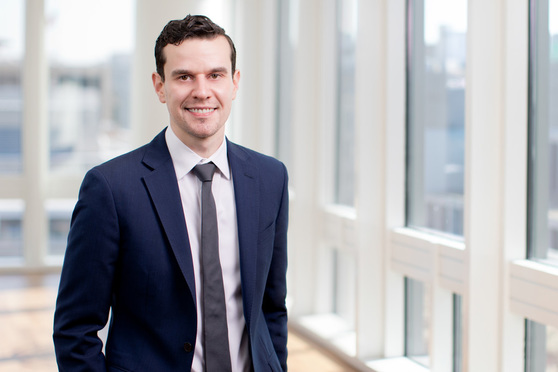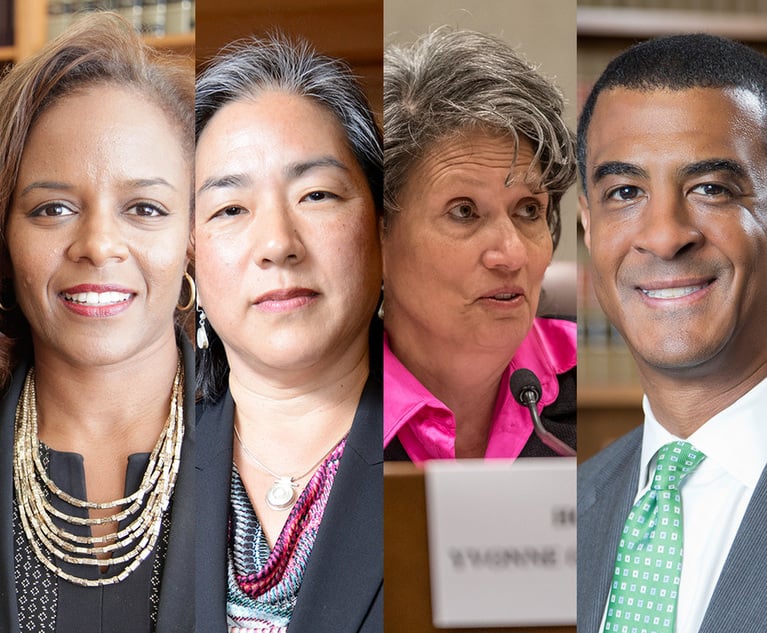Daily Dicta: O'Melveny Associate Gets Convictions Against Border Activists for Leaving Water in the Desert Reversed
Of all the ugly, mean-spirited cases to bring, it's hard to top prosecuting people for leaving caches of water and food in the desert wilderness…
February 05, 2020 at 12:05 AM
7 minute read
 O'Melveny & Myers associate Ephraim McDowell.
O'Melveny & Myers associate Ephraim McDowell.
Of all the ugly, mean-spirited cases to bring, it's hard to top prosecuting people for leaving caches of water and food in the desert wilderness so that undocumented immigrants crossing the border don't die of thirst.
But actually beating the federal criminal charges against border activists for entering the Cabeza Prieta National Wildlife Refuge in Arizona without a permit and leaving supplies in violation of regulations? That took some lawyering.
Credit O'Melveny & Myers 4th year associate Ephraim McDowell, who convinced U.S. District Judge Rosemary Márquez in Tucson to overrule a magistrate judge and reverse the convictions of four volunteers with "No More Deaths/No Más Muertes" on religious freedom grounds.
In a 22-page decision released Monday, Márquez found that the volunteers were being prosecuted for actions that constituted a sincere "exercise of religion," and that the government had no compelling interest in going after them.
"Although defendants were not charged with any immigration-related offense, the government nonetheless claims that defendants' actions 'furthered and encouraged illegal smuggling activity in the [wildlife refuge],'" the judge wrote. "The government seems to rely on a deterrence theory, reasoning that preventing clean water and food from being placed on the refuge would increase the risk of death or extreme illness for those seeking to cross unlawfully, which in turn would discourage or deter people from attempting to enter without authorization."
 "In other words," Márquez continued, "the government claims a compelling interest in preventing defendants from interfering with a border enforcement strategy of deterrence by death. This gruesome logic is profoundly disturbing. It is also speculative and unsupported by evidence."
"In other words," Márquez continued, "the government claims a compelling interest in preventing defendants from interfering with a border enforcement strategy of deterrence by death. This gruesome logic is profoundly disturbing. It is also speculative and unsupported by evidence."
McDowell, a Harvard Law School grad who joined O'Melveny after clerking for U.S. Supreme Court Justice Elena Kagan and Chief Judge Merrick Garland on the U.S. Court of Appeals for the D.C. Circuit, became involved in the case after seeing a newspaper account of the No More Deaths volunteers' criminal convictions. The four defendants were ordered to pay fines and sentenced to probation by Magistrate Judge Bernardo Velasco in the District of Arizona.
"I thought they had a viable legal theory" to reverse their convictions, McDowell said in an interview.
A member of O'Melveny's appellate and Supreme Court practice group, he pitched the idea to practice chair Jonathan Hacker, who enthusiastically backed the pro bono representation—and handed McDowell the reins to the case.
"It's one reason I decided to join O'Melveny," McDowell said. "The firm leadership is very encouraging of young attorneys, giving them the opportunity to take lead roles, especially in high-profile pro bono cases."
Indeed, McDowell first came on my radar in October, when he was a key part of the multi-firm team that won Litigator of the Week for challenging President Trump's bid to secure border wall funding by declaring a national emergency.
At the time, O'Melveny partner Anton Metlitsky said McDowell "really mastered the materials as we were preparing for and drafting the summary judgment papers."
Metlitsky continued, "It was particularly gratifying when the team entrusted Ephraim—who had not argued in court before but was obviously fluent with the materials and issues in the case—with the responsibility to argue the merits of our summary judgment motion."
With the win on behalf of No More Deaths, McDowell's star continues to rise.
In appealing the magistrate judge's ruling, he argued that the prosecution against the four defendants was barred by the Religious Freedom Restoration Act, which exempts religious believers from laws that substantially burden the exercise of their religious beliefs.
On August 13, 2017, the defendants entered the Cabeza Prieta National Wildlife Refuge, drove down a restricted-access road, and left bottles of water and cans of food along foot trails used by people entering the United States unlawfully.
The previous month, the permit application to visit the refuge was amended to specifically prohibit leaving "water bottles, water containers, food, food items, food containers, blankets, clothing, footwear, [and] medical supplies."
It was a hot day—above 100 degrees—and the 860,000-acre refuge contains no safe sources of drinking water. In 2017, 32 sets of human remains were found there. The No More Deaths volunteers left the supplies in places where people had died.
The volunteers got caught by a Fish and Wildlife Services officer, who told them to leave, which they did. No citations were issued.
But five months later, they were charged by criminal information with entering the refuge without a permit and abandoning property there. One defendant was also charged with driving in a wilderness area.
After a three-day bench trial, they were convicted of all counts.
In invoking the Religious Freedom Restoration Act defense, McDowell needed to show that the governmental action burdened a sincere "exercise of religion" and that the burden was "substantial."
No More Deaths is a "ministry" of the Unitarian Universalist Church of Tucson, and the truck that the defendants were driving was registered to the church. While none of the defendants considered themselves to be members of specific congregations, all testified about the deeply spiritual nature of their volunteer work. "Defendants hold views which, although perhaps idiosyncratic, are 'closely tied' to traditional Christian beliefs," Márquez found.
But are their beliefs sincere? The government argued that the defendants "recited" religious beliefs "for the purpose of draping religious garb over their political activity."
The judge was not persuaded. "It is well established that sincere religious beliefs are no less deserving of protection merely because they may overlap with political or other secular beliefs," she found.
She also distinguished the facts here from cases where courts found claimants to be insincere, such as the man who said his religious beliefs prohibited drawing blood for a legally mandated DNA test, yet he had no problem with getting tattoos and shooting IV drugs.
The No More Deaths defendants, by contrast, "were convicted for activities that included hiking food and water into a rugged, unforgiving wilderness during Southern Arizona's extreme August heat," Márquez wrote. As one defendant put it, "[H]iking around in 110 degrees is not what I want to be doing with my time, but I do it because I feel the need to and obligated to be there and do my part."
Nor did the judge find the government had a compelling interest in imposing a substantial burden on the volunteers' ability to exercise their faith.
In addition to blasting the government's "strategy of deterrence by death," Márquez rejected the claim that the restrictions on leaving food and water were necessary to protect the "pristine" nature of the refuge.
The site is a former active military bombing range with unexploded munitions strewn about, she noted, plus it's already littered with trash from border crossers. Also, the U.S. Border Patrol zips around both on-road and off to apprehend undocumented immigrants, which also takes an environmental toll.
"Given this context, the government cannot claim a compelling interest in 'maintain[ing]' the CPNWR as 'pristine,'" the judge found. Besides, she noted, the No More Deaths volunteers bring garbage bags and pick up trash, mitigating any damage from leaving fresh food and water.
McDowell said he and his clients were "very grateful" that Márquez penned such a thorough and thoughtful opinion. "I'm extremely happy for my clients," he said. "They really were sincere in testifying about their religious beliefs."
This content has been archived. It is available through our partners, LexisNexis® and Bloomberg Law.
To view this content, please continue to their sites.
Not a Lexis Subscriber?
Subscribe Now
Not a Bloomberg Law Subscriber?
Subscribe Now
NOT FOR REPRINT
© 2025 ALM Global, LLC, All Rights Reserved. Request academic re-use from www.copyright.com. All other uses, submit a request to [email protected]. For more information visit Asset & Logo Licensing.
You Might Like
View All
‘Listen, Listen, Listen’: Some Practice Tips From Judges in the Oakland Federal Courthouse

Litigators of the Week: A Knockout Blow to Latest FCC Net Neutrality Rules After ‘Loper Bright’

An ‘Indiana Jones Moment’: Mayer Brown’s John Nadolenco and Kelly Kramer on the 10-Year Legal Saga of the Bahia Emerald

Litigators of the Week: A Win for Homeless Veterans On the VA's West LA Campus
Law Firms Mentioned
Trending Stories
- 1January Petitions Press High Court on Guns, Birth Certificate Sex Classifications
- 2'A Waste of Your Time': Practice Tips From Judges in the Oakland Federal Courthouse
- 3Judge Extends Tom Girardi's Time in Prison Medical Facility to Feb. 20
- 4Supreme Court Denies Trump's Request to Pause Pending Environmental Cases
- 5‘Blitzkrieg of Lawlessness’: Environmental Lawyers Decry EPA Spending Freeze
Who Got The Work
J. Brugh Lower of Gibbons has entered an appearance for industrial equipment supplier Devco Corporation in a pending trademark infringement lawsuit. The suit, accusing the defendant of selling knock-off Graco products, was filed Dec. 18 in New Jersey District Court by Rivkin Radler on behalf of Graco Inc. and Graco Minnesota. The case, assigned to U.S. District Judge Zahid N. Quraishi, is 3:24-cv-11294, Graco Inc. et al v. Devco Corporation.
Who Got The Work
Rebecca Maller-Stein and Kent A. Yalowitz of Arnold & Porter Kaye Scholer have entered their appearances for Hanaco Venture Capital and its executives, Lior Prosor and David Frankel, in a pending securities lawsuit. The action, filed on Dec. 24 in New York Southern District Court by Zell, Aron & Co. on behalf of Goldeneye Advisors, accuses the defendants of negligently and fraudulently managing the plaintiff's $1 million investment. The case, assigned to U.S. District Judge Vernon S. Broderick, is 1:24-cv-09918, Goldeneye Advisors, LLC v. Hanaco Venture Capital, Ltd. et al.
Who Got The Work
Attorneys from A&O Shearman has stepped in as defense counsel for Toronto-Dominion Bank and other defendants in a pending securities class action. The suit, filed Dec. 11 in New York Southern District Court by Bleichmar Fonti & Auld, accuses the defendants of concealing the bank's 'pervasive' deficiencies in regards to its compliance with the Bank Secrecy Act and the quality of its anti-money laundering controls. The case, assigned to U.S. District Judge Arun Subramanian, is 1:24-cv-09445, Gonzalez v. The Toronto-Dominion Bank et al.
Who Got The Work
Crown Castle International, a Pennsylvania company providing shared communications infrastructure, has turned to Luke D. Wolf of Gordon Rees Scully Mansukhani to fend off a pending breach-of-contract lawsuit. The court action, filed Nov. 25 in Michigan Eastern District Court by Hooper Hathaway PC on behalf of The Town Residences LLC, accuses Crown Castle of failing to transfer approximately $30,000 in utility payments from T-Mobile in breach of a roof-top lease and assignment agreement. The case, assigned to U.S. District Judge Susan K. Declercq, is 2:24-cv-13131, The Town Residences LLC v. T-Mobile US, Inc. et al.
Who Got The Work
Wilfred P. Coronato and Daniel M. Schwartz of McCarter & English have stepped in as defense counsel to Electrolux Home Products Inc. in a pending product liability lawsuit. The court action, filed Nov. 26 in New York Eastern District Court by Poulos Lopiccolo PC and Nagel Rice LLP on behalf of David Stern, alleges that the defendant's refrigerators’ drawers and shelving repeatedly break and fall apart within months after purchase. The case, assigned to U.S. District Judge Joan M. Azrack, is 2:24-cv-08204, Stern v. Electrolux Home Products, Inc.
Featured Firms
Law Offices of Gary Martin Hays & Associates, P.C.
(470) 294-1674
Law Offices of Mark E. Salomone
(857) 444-6468
Smith & Hassler
(713) 739-1250






